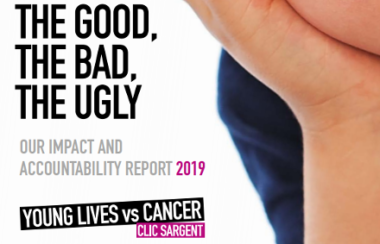CLIC Sargent has revealed its “golden formula” for measuring how “charities should be judged” in its impact and accountability report 2019.
The formula looks at the number of people reached, impact on those people and how much was spent to produce those impacts.
This is the second year the children's cancer charity has published an impact report, which it calls, The Good, The Bad, The Ugly and which looks at CLIC Sargent’s successes, mistakes and ongoing issues.
The figures in its golden formula for impact measurement are 6,733 children and young people with cancer reached by CLIC Sargent and 23,500 people, including families, impacted by the charity’s work.
It spent £14.6m, which helped 72 per cent of those young people get their lives back on track, and helped 67 per cent of parents after their child’s treatment.
The numbers came from 126 young people and parents who responded to CLIC Sargent’s survey, out of almost 5,000 who came to the end of their services through the charity between October 2017 and March 2019.
Record £29.5m raised
CLIC Sargent raised a record £29.5m last year, up from £28.8m in 2018, according to the annual report and accounts.
Corporate partnerships raised £6.5m and £6.1m came from cash donations and regular giving.
Local fundraising initiatives and mass participation events raised £5.2m and £4m was from legacies.
Pence in the pound ‘a flawed formula’
The impact report from CLIC Sargent reverses the conventional measure of the pence in the pound, which measures spend on charitable activity, instead it says how much was raised for every pound spent on fundraising (£2.27).
The report says the pence in the pound is “a flawed formula”, and adds that differences in funding such as from government or from fundraising activity can change the number significantly.
For charities that needed to save to build bricks and mortar services, the report says: "The pence-in-the-pound ratio suffers, and ironically is over-inflated in the year the money is spent."
'The bad'
The 2019 impact report also looks at “The Bad” over the last year at CLIC Sargent, and says the charity supported a fewer newly diagnosed young cancer patients than last year.
That decrease, it says, was in part due to changes made to comply with GDPR from May 2018, but data from Cancer Research UK, which is due to be released in 2021, could also show fewer cancer diagnoses because of lower birth rates. The charity has now made it easier for patients to self-refer.
The report reveals that the charity received 99 complaints with 66 relating to door-to-door fundraising, which resulted in some changes to procedure.
Eight of the complaints were related to how clearly the charity communicated its services to families.
|
Related articles











